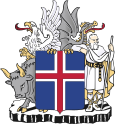| ||||||||||
| ||||||||||
| ||||||||||
 |
|---|
Presidential elections were planned to be held in Iceland on 28 June 2008. [1]
The incumbent president Ólafur Ragnar Grímsson, first elected in 1996, stated in his New Year's speech that he would contest the election for a fourth term. [2]
Ástþór Magnússon, who ran unsuccessfully in 1996 and 2004, ruled out running for the presidency. [3]
No challenger to the incumbent president filed by the deadline to declare a candidacy on 24 May 2008, [4] and so Ólafur Ragnar's fourth term was won uncontested. [5]
Ólafur Ragnar was sworn in on 1 August 2008. [6]
